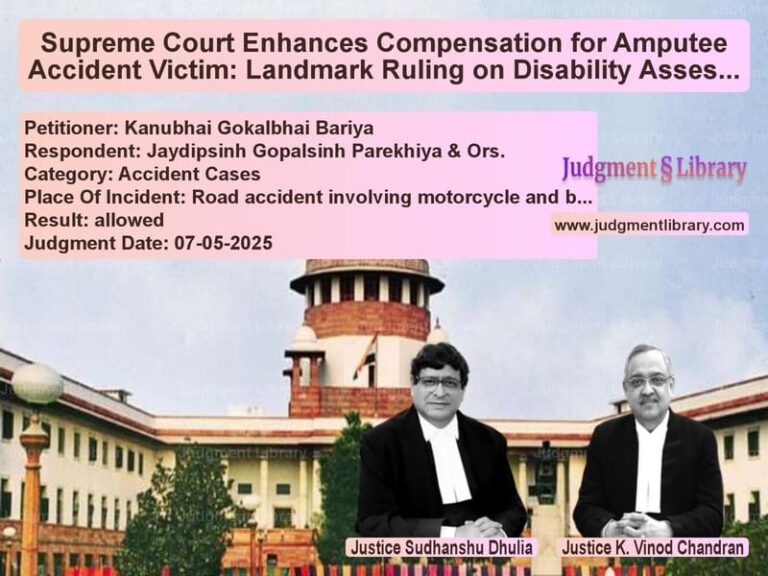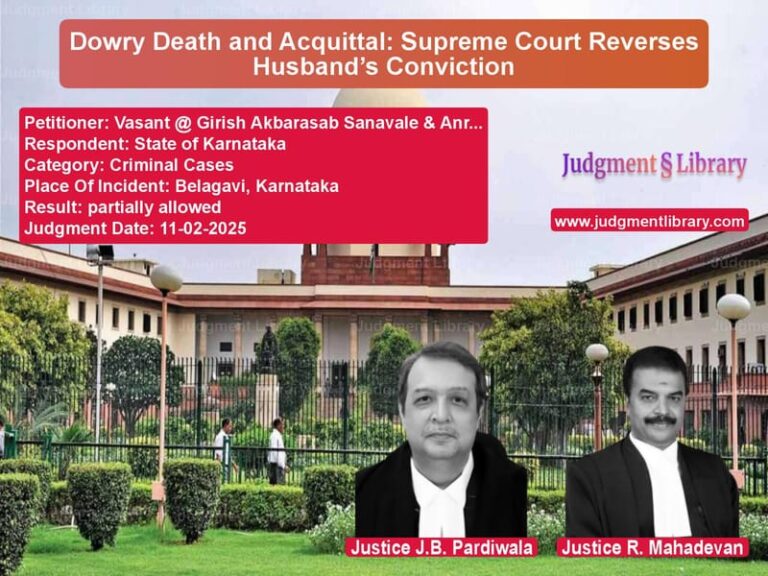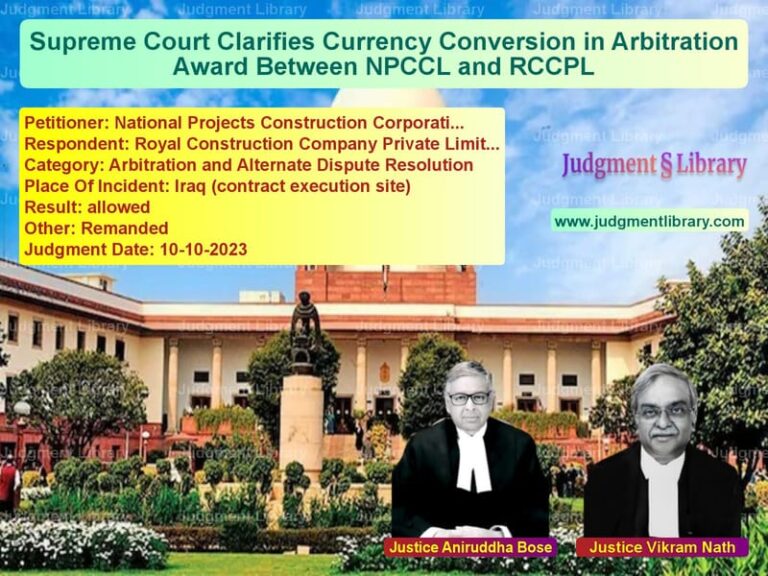Supreme Court Upholds Arbitration Clause in Property Dispute: Limits Judicial Intervention
The case of Sushma Shivkumar Daga & Anr. v. Madhurkumar Ramkrishnaji Bajaj & Ors. deals with a legal dispute over property development agreements. The key issue before the Supreme Court was whether the matter should be referred to arbitration based on the arbitration clause in the agreements or whether the civil courts should have jurisdiction. The Court upheld the arbitration clause and reinforced the principle of minimal judicial intervention in arbitration matters.
Background of the Case
The appellants, who were the plaintiffs in a civil suit, sought:
- A declaration that the Conveyance Deed dated 17.12.2019 be declared null and void.
- A ruling that five registered Development Agreements dated between 2007 and 2008 stand validly terminated.
The respondents, who were the defendants, moved an application under Section 8 of the Arbitration and Conciliation Act, 1996, arguing that the dispute should be referred to arbitration as per the arbitration clause in two earlier agreements—Tripartite Agreements dated 31.03.2007 and 25.07.2008.
The Trial Court allowed the defendants’ application and referred the matter to arbitration. The appellants challenged this decision in the Bombay High Court, which upheld the Trial Court’s ruling. The appellants then approached the Supreme Court.
Legal Issues Raised
The Supreme Court had to determine:
- Whether the arbitration clause in the 2007 and 2008 Tripartite Agreements covered the disputes related to the 2019 Conveyance Deed and the Development Agreements.
- Whether the civil suit involved non-arbitrable issues.
- To what extent courts can intervene in matters governed by an arbitration agreement.
Arguments of the Appellants (Plaintiffs)
The appellants, represented by their counsel, argued:
- The arbitration clause in the 2007 and 2008 agreements could not apply to disputes arising from the 2019 Conveyance Deed.
- The matter involved issues concerning property ownership, which should be adjudicated by a civil court.
- The claims were in the nature of an action in rem (affecting third-party rights), making them non-arbitrable.
- Allegations of fraud were involved, which further made the matter inappropriate for arbitration.
Arguments of the Respondents (Defendants)
The respondents argued:
- The arbitration clause was broad enough to cover all disputes arising from the agreements.
- The Supreme Court has consistently held that civil courts should not intervene when a valid arbitration clause exists.
- The dispute did not involve public interest or third-party rights, making it arbitrable.
Supreme Court’s Observations
1. Broad Scope of the Arbitration Clause
The Supreme Court noted that the arbitration clause in the 2007 and 2008 Tripartite Agreements covered “any disputes or differences between the parties in relation to the agreement.” The Court observed:
“The language of the arbitration clause is broad and includes any disputes arising from or touching upon the agreements. The disputes in the civil suit have their origin in the agreements that contain an arbitration clause.”
2. Minimal Judicial Intervention in Arbitration Matters
The Court referred to Section 5 of the Arbitration and Conciliation Act, 1996, which mandates minimal judicial intervention. It reiterated that courts should refer parties to arbitration unless it is clear that no valid arbitration agreement exists.
3. Non-Arbitrability of Certain Disputes
The Court examined whether the case fell into any of the categories of non-arbitrable disputes, such as:
- Matrimonial disputes
- Guardianship matters
- Insolvency and winding-up cases
- Criminal cases
- Disputes affecting third-party rights (actions in rem)
The Court ruled that the present dispute was not an action in rem and did not affect public interest or statutory rights, making it suitable for arbitration.
4. Allegations of Fraud Do Not Automatically Make a Case Non-Arbitrable
The appellants contended that the case involved fraud, making it non-arbitrable. The Court rejected this argument, stating:
“A plea of fraud must be serious in nature and should permeate the entire agreement. Mere allegations of fraud between parties do not render a dispute non-arbitrable.”
5. Competence of Arbitral Tribunal to Rule on Jurisdiction
The Court invoked the kompetenz-kompetenz principle under Section 16 of the Arbitration Act, which allows the arbitral tribunal to rule on its own jurisdiction, including objections to the existence or validity of the arbitration agreement.
Read also: https://judgmentlibrary.com/supreme-court-rules-on-loss-of-profit-claims-in-arbitration-disputes/
The Court emphasized that the arbitrator, not the civil court, should decide whether the dispute is arbitrable.
Final Judgment
The Supreme Court ruled:
- The arbitration clause in the 2007 and 2008 Tripartite Agreements was valid and covered the disputes.
- The matter should be decided by arbitration, not by a civil court.
- The Trial Court and the High Court had rightly referred the case to arbitration.
- The appeal was dismissed.
The Court held:
“The trial court and the High Court have given a correct finding on facts as well as on law. We find no scope for interference in the matter. This appeal has no force and is hereby dismissed.”
Key Takeaways
1. Arbitration Clauses Must Be Honored
When parties have agreed to resolve disputes through arbitration, courts should not interfere unless the case is manifestly non-arbitrable.
2. Allegations of Fraud Do Not Automatically Invalidate Arbitration
Unless fraud affects the arbitration agreement itself, disputes must still be referred to arbitration.
3. Courts Have Limited Power in Arbitration Matters
The ruling reinforces that judicial authorities should refer cases to arbitration unless it is evident that the arbitration agreement is invalid.
4. Arbitral Tribunal Has the First Right to Rule on Jurisdiction
The arbitral tribunal has the power to determine whether a dispute falls within its jurisdiction.
Conclusion
The Supreme Court’s judgment in this case reinforces the principle of minimal judicial interference in arbitration. It upholds the autonomy of arbitration agreements and ensures that commercial disputes are resolved efficiently. The ruling is a strong affirmation of India’s pro-arbitration stance, ensuring that arbitration clauses in valid agreements are strictly enforced.
Petitioner Name: Sushma Shivkumar Daga & Anr..Respondent Name: Madhurkumar Ramkrishnaji Bajaj & Ors..Judgment By: Justice Aniruddha Bose, Justice Sudhanshu Dhulia.Place Of Incident: Maharashtra.Judgment Date: 14-12-2023.
Don’t miss out on the full details! Download the complete judgment in PDF format below and gain valuable insights instantly!
Download Judgment: sushma-shivkumar-dag-vs-madhurkumar-ramkrish-supreme-court-of-india-judgment-dated-14-12-2023.pdf
Directly Download Judgment: Directly download this Judgment
See all petitions in Arbitration Act
See all petitions in Dispute Resolution Mechanisms
See all petitions in Enforcement of Awards
See all petitions in Settlement Agreements
See all petitions in Judgment by Aniruddha Bose
See all petitions in Judgment by Sudhanshu Dhulia
See all petitions in dismissed
See all petitions in supreme court of India judgments December 2023
See all petitions in 2023 judgments
See all posts in Arbitration and Alternate Dispute Resolution Category
See all allowed petitions in Arbitration and Alternate Dispute Resolution Category
See all Dismissed petitions in Arbitration and Alternate Dispute Resolution Category
See all partially allowed petitions in Arbitration and Alternate Dispute Resolution Category







